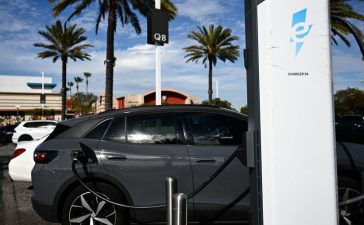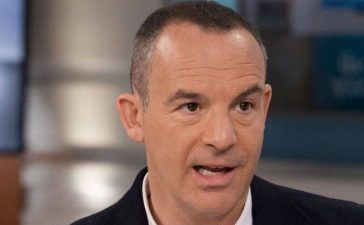Key events
Consumer Council for Water: regulator should not be held to ‘ransom’ to allow firms to hike bills

Alex Lawson
The consumer body representing customers in the water industry has said the industry regulator should not be held to “ransom” to allow “unjustified” financing costs to push up bills.
Ofwat is currently analysing the five-year business plans submitted by under pressure water suppliers last year to determine how much they are allowed to recover from customer bills to fund operations and investment. It has set out an assumption for the cost of financing these investments.
However, the Consumer Council for Water (CCW) has said that two companies, Wessex Water and the troubled Thames Water, have assumed a higher financing cost in their plans, pushing up planned bill hikes.
“Ofwat should not be held to ransom by companies saying that they cannot deliver improvements for customers and the environment without exceptional costs being allowed that may be inefficient or unjustified,” the CCW said.
The regulator will give its draft view on the plans this summer.
In a wide-ranging response to Ofwat five-year plans, the CCW has also crunched the numbers on the forecast bill increases between 2025 and 2030. It found that Southern Water plans to hike bills by 70% and Thames Water 56% – the biggest increases in the sector – when inflation is factored in. Southern’s figure stripping out inflation was 64%, and Thames 40%.
It points out that both have performed poorly on metrics important to consumers of late and argues delivering the improvements laid out in their plans would be “extremely challenging”.
Customers will see a big increase in their water bills and would not like their hard-earned cash taken off them if it is unlikely to be spent as planned. Consumers will need assurance that strong enough protections are in place to stop that happening.
AstraZeneca buys French rare diseases specialist in $1bn deal
Britain’s biggest drugmaker AstraZeneca has announced another acquisition: it is buying a French endocrine diseases specialist for $1.05bn to boost its rate diseases portfolio.
The company has struck an agreement to acquire Amolyt Pharma, which is developing novel treatments for rare endocrine diseases. The deal will beef up its rare diseases division Alexion’s late-state pipeline of new medicines.
Amolyt is testing a treatment for hypoparathyroidism in phase III clinical trials, a therapy called eneboparatide.
Hypoparathyroidisma is a rare condition where the parathyroid glands, which are in the neck near the thyroid gland, don’t produce enough parathyroid hormone. This causes blood calcium levels to fall (hypocalcaemia) and blood phosphorus levels to rise (hyperphosphataemia), which can cause a wide range of symptoms, including muscle cramps, pain and twitching, as well as complications, including chronic kidney disease.
Treatment for hypoparathyroidism involves taking supplements, usually for life, to restore calcium and phosphorus levels.
It is one of the largest known rare diseases, affecting an estimated 115,000 people in the United States and 107,000 people in the European Union, about 80% of whom are women.
Marc Dunoyer, who runs AstraZeneca’s Alexion rare diseases business, told Reuters that the treatment has blockbuster potential – i.e. is expected to make at least $1bn revenues a year if the final trials go well and it is approved by regulators. He said in a statement:
Chronic hypoparathyroid patients face a significant need for an alternative to current supportive therapies, which do not address the underlying hormone deficiency. As leaders in rare disease, Alexion is uniquely positioned to drive the late-stage development and global commercialisation of eneboparatide, which has the potential to lessen the often debilitating impact of low parathyroid hormone and avoid the risks of high-dose calcium supplementation. We believe this programme, together with Amolyt’s talented team, expertise and earlier pipeline, will enable our expansion into rare endocrinology.
Thierry Abribat, Amolyt’s chief executive, said:
We enthusiastically welcome the proposed acquisition of Amolyt by AstraZeneca… This agreement offers the opportunity to meaningfully advance our pipeline therapies. Strong Phase II data suggest eneboparatide has the potential to improve outcomes for patients and to shift the treatment paradigm for hypoparathyroidism, and we look forward to seeing the continued advancement of the Phase III trial.
Phase II data showed that eneboparatide achieved normalisation of serum calcium levels as well as the potential to eliminate dependence on daily calcium and vitamin D supplementation. In adults with chronic hypoparathyroidism and hypercalciuria, results showed that eneboparatide normalised calcium in urine.
In addition, for patients with hypoparathyroidism, eneboparatide preserved bone mineral density, an important potential benefit in patients with an increased risk of osteopenia or osteoporosis.
Under the terms of the deal, AstraZeneca is to make an $800m upfront payment and an additional $250m dependent on the achievement of a regulatory milestone.
The company has been making a string of acquisitions. Alexion itself was acquired for £30bn in 2020, and made nearly $7.8bn in revenues last year.
What will the EU’s proposed act to regulate AI mean for consumers?
The EU’s proposed AI act was endorsed by the European parliament yesterday, and is a milestone in regulating the technology. The vote is an important step towards introducing the legislation, which now requires the formal approval of ministers from EU member states.
Consumers will not notice an immediate difference, given that the act will be implemented over a period of three years, but it will answer some concerns over the technology.
Guillaume Couneson, partner at law firm Linklaters, said:
Users will be able to trust that the AI tools they have access to have been carefully vetted and are safe to use. This is similar to users of banking apps being able to trust that the bank has taken stringent security measures to enable them to use the apps safely.
The bill matters outside the EU because Brussels is an influential tech regulator, as shown by GDPR’s impact on the management of people’s data. The AI act could do the same.
Couneson added:
Many other countries will be watching what happens in the EU following the adoption of the AI Act. The EU approach will likely only be copied if it is shown to work.
The Groucho Club, the private members’ club known for its hell-raising 39-year history in the heart of London’s Soho is expanding for the first time to an unlikely location: the heart of the West Yorkshire countryside.
The club’s first outpost will be located near Wakefield at Bretton Hall, the former arts education facility that sits within the grounds of the Yorkshire Sculpture Park, which will be converted into a club and hotel with about 60 rooms.
The appearance of the most London of brands close to the Rhubarb Triangle may raise a few eyebrows but Ewan Venters, the CEO of Artfarm and Hauser & Wirth, said the move to Yorkshire made more sense than an oft-mooted international expansion.
“Why would we go to America first, why wouldn’t we want to go to the north of England?” he said, before getting in a gentle dig at his competitors. “I wanted to avoid the Cotswolds because that doesn’t represent our membership.”
Direct trains could next year connect Wrexham to London, with a new service capitalising on the town’s Hollywood-meets-football mini-boom.
The train manufacturer Alstom is bidding to set up the Wrexham, Shropshire and Midlands Railway with a promise of cheaper, more comfortable trains straight to London.
The three-hour journey to Euston station may not persuade Wrexham AFC co-owners Ryan Reynolds and Rob McElhenney to ditch the private jets, but the operators hope to make the greener alternative to and from the Welsh borders ever more attractive.
Dodging a wait in Birmingham will be a selling point for passengers, with trains skirting around the Midlands city on a little-used freight route, opening up new connections from Shropshire to Warwickshire.
Welsh Water to pay £40m after Ofwat found irregularities
Welsh Water will have to pay nearly £40m to benefit its customers, after an investigation by the regulator Ofwat found the utility misled customers and regulators on its performance on leakage and per capita consumption.
Welsh Water will provide £39.4m to compensate customers for its failures, the regulator said. Of this, £15m has already been announced by Welsh Water, with another £9.4m to follow, which will lower bills for customers. An additional £15m of costs will be absorbed by the company, rather than passed on to customers.
The company also needs to address its poor performance on leakage and consumption, and has committed to invest an additional £59m by 2025.
David Black, CEO at Ofwat, said:
We need to invest tens of billions of pounds over the next 30 years to reduce pollution and ensure that our water infrastructure can grow with our population and adapt for climate change. Customers and investors will only agree to fund this if they trust water companies to provide accurate information about their performance.
For five years, Welsh Water misled customers and regulators on its record of tackling leakage and saving water. It is simply indefensible and that is why we are making Welsh Water pay this £40m to benefit its customers.
Today’s announcement puts the industry on notice that we have the resources and will act when companies fail to meet their obligations to customers.
Ofwat said the company identified issues with its reporting and notified the regulator, which then investigated and found evidence that a “significant failure of governance and management oversight” led to the water company misreporting its leakage and consumption performance figures over five years, significantly underplaying its poor performance.
The watchdog said it had increased the size of its enforcement function to drive up standards in the industry.
Welsh Water apologised again, and said it had paid a £10 rebate to 1.4 million customers in 2023. It said it had made changes to its processes and operational structures to address the issues.
Pete Perry, the company’s chief executive, said:
We are very sorry that this happened. We proactively brought this issue to Ofwat’s attention in April 2022 having identified it as part of our annual performance assurance process.
Our review identified governance and management oversight failures that led to the issues identified which have now been addressed. Achieving the planned reduction in leakage will be challenging, but we have committed a substantial increase in expenditure in this area and strengthened the relevant operational teams to recover performance.
FCA: car finance unlikely to reach scale of PPI scandal

Kalyeena Makortoff
The city watchdog has said its investigation into potential mis-selling in the car finance industry is unlikely to reach the scale of the PPI scandal, which saw banks pay out nearly £50bn over more than a decade.
Nikhil Rathi, the chief executive of the Financial Conduct Authority, said he understood there was “uncertainty” about the scale of potential fines and compensation, but he played down comparisons with PPI.
Referring to comments by consumer champion Martin Lewis, who warned in January that the issue could become the “new” payment protection insurance scandal, Rathi said:
Some – not us – have sought to draw comparisons with PPI
In PPI, the regulator’s work took place over many years and this and action on redress dragged on for some time.
I do not anticipate this issue playing out as PPI did, not least because we have intervened early in the interests of market orderliness,
he told attendees at the Morgan Stanley European Financials Conference in London.
However, Rathi said the FCA’s prompt intervention should assure both industry and consumers that any wrongdoing would be dealt with efficiently.
The FCA is looking into whether consumers had been charged inflated prices for car loans, as a result of open commission arrangements, between 2007 and 2021. It has yet to announce the conclusions of its investigation and said it would set out “next steps” by the end of September.
MoneySavingExpert.com, founded by Martin Lewis, said earlier this month that more than 1m car finance complaint letters had been submitted since he launched its free car finance reclaim tool on 6 February.
PPI was Britain’s costliest and longest-running consumer scandal. As many as 64m policies were sold in the UK –mostly between 1990 and 2010, and some as far back as the 1970s – alongside loans, mortgages, credit cards and other deals.
Housing buyer enquiries, listings improve, says Rics
Buyer inquiries have risen for a second month in the UK housing market and listings also improved, according to surveyors and estate agents.
The latest monthly survey from the Royal Institution of Chartered Surveyors said the near-term outlook is still cautious, in part due to the suspicion that the recent easing in mortgage rates is likely to stall as the timing and speed of interest rate cuts remain uncertain.
New buyer enquiries stayed positive for the second successive month (+6% net balance – the number of surveyors who reported higher enquiries minus those saying they fell), showing a continued upwards trend in buyer demand. Most regions across the UK have shown a recovery in buyer interest over the last two months.
Agreed sales were flat in February (-3% net balance) and although this is less positive than in January, it still signals a stronger trend in sales than for most of the last 12 months, when the average net balance was -22%.
Looking ahead, the sales expectations for the near term are positive, and sales activity is expected to gain further momentum over the coming year (net balance +42%). Across all UK regions, sales are expected to pick up over the longer-term.
There was a solid rise being reported in new instructions to sell. The latest net balance of +21% is the strongest reading since October 2020, in contrast to the negative picture throughout 2023. Average stock levels on estate agents books now sit at 42 properties, the highest since February 2021, an there was also an increase in market appraisals over the month compared to the same period last year.
House prices still point to a downward trend across the UK as a whole, but this is stabilising with the February figure the least negative since October 2022. In London, the turnaround in prices is slightly more pronounced. Looking ahead, a net balance of +36% of respondents across England and Wales now envisage house prices returning to growth over the next 12 months.
In the lettings market, tenant demand continues to rise but at a slower pace than previously. At the same time, though, landlord instructions are still dwindling, meaning rents are expected to move higher over the coming months, albeit at a slower rate.
Simon Rubinsohn, chief economist at RICS, said:
The February RICS survey provides some grounds for encouragement around the sales market with not just buyer interest staying positive for the second successive month but also the uplift in new instructions to agents. Whether the increase in stock coming back to the market will be sustained is likely to be a critical factor in explaining how things play out over the balance of the year especially with new build likely to remain constrained. Significantly, the rise in the number of appraisals taking place points in the right direction. And the government will be hoping that this trend is given a boost by the change to capital gains tax announced in the budget.
Meanwhile, there are signs that the relentless upward trend in private rents is losing momentum but fresh demand is still comfortably outstripping supply in this area which suggests there is unlikely to any significant relief for tenants. Indeed, feedback from respondents to the survey continue to highlight the challenges in the sector resulting from a whole host of measures introduced in recent years.
Here is our full story on Shell.
The energy company Shell has watered down one of its climate ambitions as it prepares to keep its oil production stable while growing its liquified natural gas business.
The company used its latest energy transition strategy to warn that it may slow the pace of its emissions reductions this decade, saying that it now wants to reduce the carbon emissions intensity of the energy it sells by 15-20% by 2030, compared with its previous target of 20%. The target is measured against 2016.
The updated target will enable Shell to slow the pace of its emissions reductions in a decade that climate scientists have warned is crucial in averting a climate catastrophe.
The oil company has also promised to cut emissions from producing oil and gas – but it will continue to keep its oil production stable while growing its liquified natural gas business, meaning overall emissions on an absolute basis could continue to rise.
Nearly 5,000 UK chain stores closed last year – 14 a day
In other retail news, almost 5,000 more chain stores were left empty last year – a rate of about 14 closures a day – as high streets were hurt by the failure of Wilko and the retreat of banks and pubs.
Pharmacies were the biggest loser with 787 chain outlets disappearing – although many of these were Lloyds outlets which were taken over by independents.
Next in line were pubs with a net 722 closing, as Wetherspoon’s and Stonegate, the owner of the Slug and Lettuce brand, closed venues.
The figures from the Local Data Company for the advisory firm PricewaterhouseCoopers showed the rate of net closures was up by a third from 3,627, but far short of the post-pandemic peak of more than 10,000 in 2021. The figures do not include the many thousands of independent outlets trading in the UK.
Review into August air traffic control meltdown finds ‘lack of pre-planning’
An independent review into the August bank holiday air traffic control meltdown that caused chaos for nearly 750,000 passengers has highlighted a “significant lack of pre-planning”.
Flights were grounded across UK airports on 28 August after National Air Traffic Services (Nats) suffered a technical glitch while processing a flight plan.
An interim report from an inquiry, published by the regulator, the Civil Aviation Authority, found there does not appear to have been “any multi-agency rehearsal of the management of an incident of this nature and scale”.
These rehearsals are “best practice” and “regularly conducted in other sectors”, the inquiry panel said.
The report said:
The panel expects to recommend that the CAA should review and lead such multiagency planning. This is especially important, as some relationships between aviation sector stakeholders appear to be adversarial.
This is not to the benefit of passengers, especially in a crisis situation such as this incident.
It is clear there is a significant lack of pre-planning and co-ordination for major events and incidents that targets the alleviation and remediation of major incidents.
At the time, a technical report from Nats blamed an “extremely rare set of circumstances” when a single flight plan with confusing waypoint data brought its bespoke software system to a halt on 28 August. An error triggered by the plan – which was correctly submitted by an incoming airline – forced the system to stop processing flight plans automatically, leaving controllers to handle operations manually.
Many affected passengers were required to pay up front for alternative flights, food and accommodation, and submitted claims to airlines for reimbursement, even though airlines are legally required to provide these.
The inquiry panel described the financial cost to passengers as “very considerable”, but noted that the “stress and anxiety” was “at least as serious”.
Some travellers were stranded overseas for several days because of the number of flight cancellations.
Robyn Duffy, senior analyst for consumer markets at the consulting firm RSM UK, said:
John Lewis is back in the black, but there are hard yards to travel before the retailer can confidently hail a return to form. Divisionally, the food arm of the business Waitrose is performing well after recovering from last year’s availability issues, but needs a cash injection to really compete with its rivals. As for John Lewis, the theme is ‘loafers, not sofas’ with consumers spending more on themselves rather than their homes.
Despite being one of Britain’s best-known brands, John Lewis has struggled to stay relevant in recent years. A fast-moving economic environment has meant changing consumer habits have got the better of the business as the brand seemed to be missing the mark, whilst direct competitors Next and Marks & Spencer have prospered.
As an employee-owned business that has failed to pay bonuses for several years, and with competitors seeing strong growth, the pressure is now on for new leadership to bring positive change. New CEO Nish Kankiwala has announced a ‘back-to-basics’ approach and plans to put retail back at the heart of John Lewis. Noise around the proposed housing and financial services plays have quieted for now, both interesting ideas but in a challenging retail environment a return to core values is needed.
Only a few years ago John Lewis was the go-to retailer for the middle classes as it delivered quality at the best possible price. Returning to core values alongside investment in technology mirrors the fundamentals from other high street success stories and should help the business further improve margin.
Overall, John Lewis gained 1 million new customers last year, taking the total to 22.6 million (including 13.4 million at the John Lewis department stores).
But Yanmei Tang, analyst at Third Bridge, said:
The department store industry continues to struggle amid a cost-of-living crisis. John Lewis, with its significant reliance on home sales for revenue, may face even greater challenges ahead. The persistently sluggish housing market is unlikely to provide any relief.
John Lewis also faces stiff competition from online giants like Amazon, as well as newcomers such as M&S and Next. They need to maintain its differentiation in assortment and keep real exclusivity of some of the brands.
Expectations are for more store closures as they adjust their footprint, with increased investment in key locations. Despite this, John Lewis’ strong online presence means that while store closures may occur, sales are likely to shift online rather than being lost entirely.
Margins are being squeezed by rising labour wages and input costs. John Lewis faces the challenge of maintaining its value proposition without simply raising consumer prices.
Here is our full story on John Lewis bouncing back to profit.
The staff-owned retailer, which employs about 74,000 people – known as “partners” – said that after “careful consideration” it would not pay its staff an annual bonus for the third time in four years. It said that instead, “at this point in our transformation, [a sustainable business] is best served by investing in our retail businesses and in partners’ base pay.”
It plans to refurbish 80 Waitrose stores and open new supermarkets in some areas while investing in technology to improve the John Lewis website and customer service for shoppers in stores.
The company said it was “entering a year of significant investment” with £542m planned to be spent – up 70% on a year before.
The investment will also go towards “simplifying the way we work”, suggesting job cuts may be on the cards this year. The group is thought to be considering cutting up to 11,000 jobs over the next five years.
Sharon White, the firm’s chair, said the return to profit came after making £88m of savings, mainly by better matching staff hours to need in Waitrose shops and also by cutting energy use and more automation in the John Lewis distribution network.
Total sales, excluding VAT, rose by 2% to £10.8bn. At Waitrose supermarkets, sales rose by 5%.
However, sales at the John Lewis department stores fell by 4% to £4.8bn, despite inflation of more than 5% last year. The company said it had recorded weak sales of homeware and tech but sales of fashion, including beauty products, were up.
Beauty sales were up by 4% on strong sellers such as men’s tailoring – up by 48% – and lingerie, up by 8%.
Shell warns it may slow emissions reduction during crucial climate decade
Jillian Ambrose
Shell has warned that it may slow the pace of its emissions reductions this decade as it prepares to keep its oil production stable while growing its liquified natural gas (LNG) business.
The oil giant used its latest energy transition strategy to water down a promise to reduce the carbon emissions intensity of the energy it sells by 20% by 2030 versus the 2016 baseline.
The updated target gives a range of between 15% -20% over the same period, which allow Shell to slow the pace of its emissions reductions in a decade which climate scientists have warned is crucial in averting a climate catastrophe.
The oil company has also promised to cut emissions from producing oil and gas – but it will continue to keep its oil production stable while growing its LNG business, meaning overall emissions on an absolute basis could continue to rise.
Wael Sawan, Shell’s chief executive, said:
A balanced energy transition, which Shell supports, is one that maintains secure and affordable energy supplies, while the world builds the clean energy system of the future.”
Billions of people depend on energy and hundreds of millions still hope to have access to it. Energy is vital for lives everywhere.
Last month Shell revealed an annual profit of more than $28bn (£22bn) for 2023, one of its most profitable years on record, as green activists staged a protest outside the company’s London headquarters.
Sawan was paid a total package of £7.9m last year, the group’s annual report showed. He took over from Ben van Beurden at the start of 2023, who was paid more – £9.7m in 2022.
John Lewis boss dismisses speculation about Waitrose split
Sharon White, the chair of John Lewis, has been on the radio 4 Today programme talking about the results. She said:
We’ve returned to profit, and that’s strength across both brands. If you look at the last year, actually customer numbers have grown.
She defended the company’s decision not to pay a staff bonus for the second year running.
The great thing about the partnership, and we are the biggest employee-owned business in the UK, is that we can take a long term view. We are really prioritising ensuring that we invest in customers but also investing in pay for partners so this year, we are investing £160m in pay, which is a record level.
Q: There is growing speculation about a possible separation between John Lewis and Waitrose, it is time for the partnership to consider that?
No, I disagree. What the results of the last year show is that the plan is working. And the brands are stronger together. We’ve got so many customers who shop across the two, love both; and the fact that we’re back to profit, the fact that customer numbers are growing, debt is down, we’ve got the balance sheet and the firepower now to invest, record levels over the next year.
Introduction: John Lewis returns to profit but pays no staff bonus; bitcoin hits new high
Good morning, and welcome to our rolling coverage of business, the financial markets and the world economy.
The John Lewis Partnership has swung back to an annual profit but will not pay a bonus to staff for the second year in a row, saying investing in pay and improving its business must take priority.
The department store chain, which also owns Waitrose, made a £56m profit before tax in 2022-23, compared with a loss of £234m the year before. Excluding exceptional items, it moved to a £42m profit from a £78m loss.
Despite a “challenging year for the sector” amid the cost of living crisis, the retailer credited better sales growth, margin and productivity improvements.
Bitcoin has hit a new all-time high, rising to $73,699.99. The cryptocurrency has been scaling new highs, and got its latest boost this week after the UK financial regulator said it would allow the trading of cryptocurrency-backed securities.
The Financial Conduct Authority said on Monday it would “not object” to investment exchanges creating a UK-listed market segment for cryptoasset-backed exchange traded notes [cETNs], a financial product that can be traded like a stock.
However, the FCA added that it would not permit the sale of the cETNs to retail investors, or members of the public.
Demand for bitcoin has also soared in recent weeks after the US financial regulator approved exchange-traded funds [ETFs] – a basket of assets that can be bought and sold like shares on an exchange – that track the price of the cryptocurrency.
There is also an upcoming “halving” of bitcoin, in which the amount of new bitcoin being generated is reduced. This is bolstering the price, by reducing supply.
The Agenda











